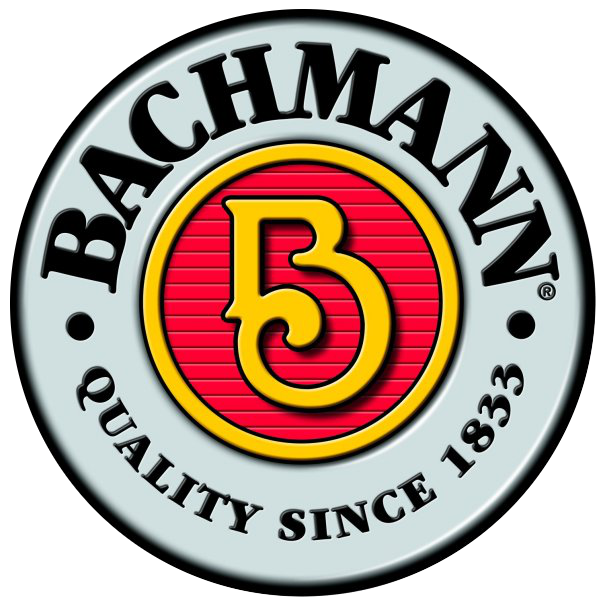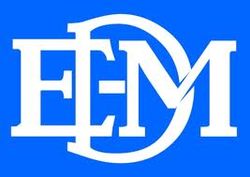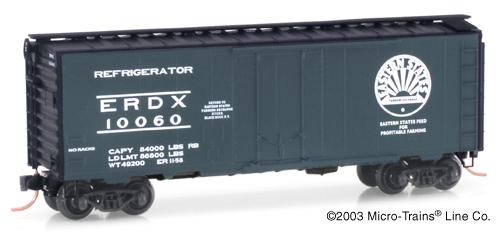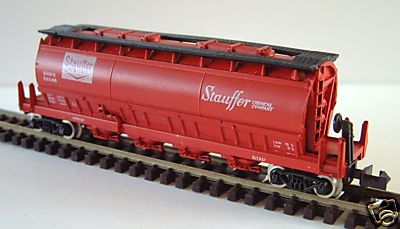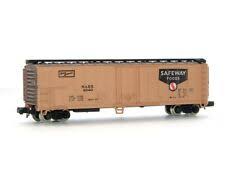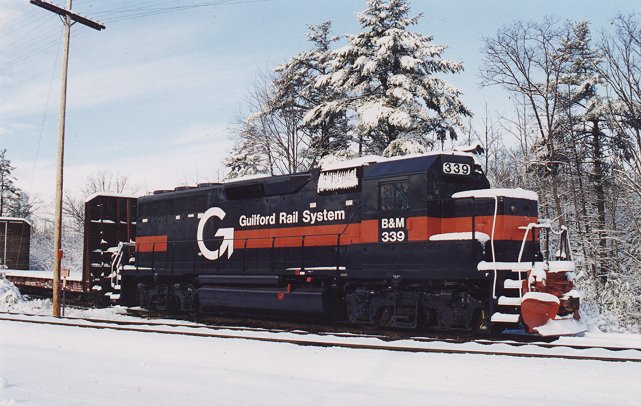Model Information: Bachmann introduced this locomotive in 1968. It had issues, so they revised the model in 1969. About twenty years later, in 1987, they modernized the mechanism to use a split-frame design. Much later, in 2018, they started producing a DCC-Friendly version.
This is a "Trainset" model, meaning it was designed to be included in beginner box sets with carts, track and a transformer. Due to the budget constraints of the "Trainset" price-point, this was necessarily a lower-quality mechanism. The early ones are loud and run poorly. They are also susceptible to wear and tear. There are dummy versions of this early model.
This is a "Trainset" model, meaning it was designed to be included in beginner box sets with carts, track and a transformer. Due to the budget constraints of the "Trainset" price-point, this was necessarily a lower-quality mechanism. The early ones are loud and run poorly. They are also susceptible to wear and tear. There are dummy versions of this early model.
DCC Information: The more recent versions are DCC-Friendly. Bachmann claims they are "DCC-Ready" but with no off-the-shelf drop-in decoders available, the best that can be said is that a DCC upgrade will be some work.
Prototype History: The GP40 is a 4-axle diesel-electric road-switcher locomotive built by General Motors, Electro-Motive Division between November 1965 and December 1971. It has an EMD 645E3 16-cylinder engine generating 3,000 hp (2,240 kW).
The GP40 is 3 feet (0.914 m) longer than its EMD 567D3A-engined predecessor, the GP35, and distinguished visually by its three 48-inch radiator fans at the rear of the long hood, while the GP35 has two large fans and a smaller one in between. It was built on a 55 ft (16.76 m) frame; the GP35 was built on a 52 ft (15.85 m) frame - as was the GP7, 9, 18, and 30. The difference in length can be seen in the GP40's ten handrail stanchions compared to the GP35's nine.
1,187 GP40s were built for 28 U.S. railroads; 16 were built for one Canadian carrier, Canadian National; and 18 were built for two Mexican carriers, Ferrocarril Chihuahua al Pacifico and Ferrocarriles Nacional de Mexico. 60 units were built with high-short-hoods and dual control stands for Norfolk & Western Railway. Two passenger versions, the GP40P and GP40TC, were also built, but on longer frames to accommodate steam generators and HEP equipment.
On January 1, 1972, the GP40 was discontinued and replaced by the GP40-2, which has a modular electrical system and a few minor exterior changes.
From Wikipedia
A Guilford/Pan Am (MEC) train headed by a high-nose GP40 ex-NW followed by two SD40M-2 (rebuilt SD45)
The GP40 is 3 feet (0.914 m) longer than its EMD 567D3A-engined predecessor, the GP35, and distinguished visually by its three 48-inch radiator fans at the rear of the long hood, while the GP35 has two large fans and a smaller one in between. It was built on a 55 ft (16.76 m) frame; the GP35 was built on a 52 ft (15.85 m) frame - as was the GP7, 9, 18, and 30. The difference in length can be seen in the GP40's ten handrail stanchions compared to the GP35's nine.
1,187 GP40s were built for 28 U.S. railroads; 16 were built for one Canadian carrier, Canadian National; and 18 were built for two Mexican carriers, Ferrocarril Chihuahua al Pacifico and Ferrocarriles Nacional de Mexico. 60 units were built with high-short-hoods and dual control stands for Norfolk & Western Railway. Two passenger versions, the GP40P and GP40TC, were also built, but on longer frames to accommodate steam generators and HEP equipment.
On January 1, 1972, the GP40 was discontinued and replaced by the GP40-2, which has a modular electrical system and a few minor exterior changes.
From Wikipedia
A Guilford/Pan Am (MEC) train headed by a high-nose GP40 ex-NW followed by two SD40M-2 (rebuilt SD45)
Road Name History: The Canadian Pacific Railway (CPR), formerly also known as CP Rail (reporting mark CP) between 1968 and 1996, is a historic Canadian Class I railroad incorporated in 1881. The railroad is owned by Canadian Pacific Railway Limited (TSX: CP, NYSE: CP), which began operations as legal owner in a corporate restructuring in 2001.
Headquartered in Calgary, Alberta, it owns approximately 23,000 kilometres (14,000 mi) of track all across Canada and into the United States, stretching from Montreal to Vancouver, and as far north as Edmonton. Its rail network also serves major cities in the United States, such as Minneapolis, Milwaukee, Detroit, Chicago, and New York City.
The railway was originally built between Eastern Canada and British Columbia between 1881 and 1885 (connecting with Ottawa Valley and Georgian Bay area lines built earlier), fulfilling a promise extended to British Columbia when it entered Confederation in 1871. It was Canada's first transcontinental railway, but currently does not reach the Atlantic coast. Primarily a freight railway, the CPR was for decades the only practical means of long-distance passenger transport in most regions of Canada, and was instrumental in the settlement and development of Western Canada. The CP became one of the largest and most powerful companies in Canada, a position it held as late as 1975. Its primary passenger services were eliminated in 1986, after being assumed by Via Rail Canada in 1978. A beaver was chosen as the railway's logo because it is the national symbol of Canada and was seen as representing the hardworking character of the company.
The company acquired two American lines in 2009: the Dakota, Minnesota and Eastern Railroad and the Iowa, Chicago and Eastern Railroad. The trackage of the ICE was at one time part of CP subsidiary Soo Line and predecessor line The Milwaukee Road. The combined DME/ICE system spanned North Dakota, South Dakota, Minnesota, Wisconsin, Nebraska and Iowa, as well as two short stretches into two other states, which included a line to Kansas City, Missouri, and a line to Chicago, Illinois, and regulatory approval to build a line into the Powder River Basin of Wyoming. It is publicly traded on both the Toronto Stock Exchange and the New York Stock Exchange under the ticker CP. Its U.S. headquarters are in Minneapolis.
After close of markets on November 17, 2015, CP announced an offer to purchase all outstanding shares of Norfolk Southern Railway, at a price in excess of the US$26 billion capitalization of the United States-based railway. If completed, this merger of the second and fourth oldest Class I railroads in North America would have formed the largest single railway company on that continent, reaching from the Pacific coast to the Atlantic coast to the Gulf Coast. The merger effort was abandoned by Canadian Pacific on April 11, 2016, after three offers were rejected by the Norfolk Southern board.
Read more on Wikipedia and on Canadian Pacific official website.
Headquartered in Calgary, Alberta, it owns approximately 23,000 kilometres (14,000 mi) of track all across Canada and into the United States, stretching from Montreal to Vancouver, and as far north as Edmonton. Its rail network also serves major cities in the United States, such as Minneapolis, Milwaukee, Detroit, Chicago, and New York City.
The railway was originally built between Eastern Canada and British Columbia between 1881 and 1885 (connecting with Ottawa Valley and Georgian Bay area lines built earlier), fulfilling a promise extended to British Columbia when it entered Confederation in 1871. It was Canada's first transcontinental railway, but currently does not reach the Atlantic coast. Primarily a freight railway, the CPR was for decades the only practical means of long-distance passenger transport in most regions of Canada, and was instrumental in the settlement and development of Western Canada. The CP became one of the largest and most powerful companies in Canada, a position it held as late as 1975. Its primary passenger services were eliminated in 1986, after being assumed by Via Rail Canada in 1978. A beaver was chosen as the railway's logo because it is the national symbol of Canada and was seen as representing the hardworking character of the company.
The company acquired two American lines in 2009: the Dakota, Minnesota and Eastern Railroad and the Iowa, Chicago and Eastern Railroad. The trackage of the ICE was at one time part of CP subsidiary Soo Line and predecessor line The Milwaukee Road. The combined DME/ICE system spanned North Dakota, South Dakota, Minnesota, Wisconsin, Nebraska and Iowa, as well as two short stretches into two other states, which included a line to Kansas City, Missouri, and a line to Chicago, Illinois, and regulatory approval to build a line into the Powder River Basin of Wyoming. It is publicly traded on both the Toronto Stock Exchange and the New York Stock Exchange under the ticker CP. Its U.S. headquarters are in Minneapolis.
After close of markets on November 17, 2015, CP announced an offer to purchase all outstanding shares of Norfolk Southern Railway, at a price in excess of the US$26 billion capitalization of the United States-based railway. If completed, this merger of the second and fourth oldest Class I railroads in North America would have formed the largest single railway company on that continent, reaching from the Pacific coast to the Atlantic coast to the Gulf Coast. The merger effort was abandoned by Canadian Pacific on April 11, 2016, after three offers were rejected by the Norfolk Southern board.
Read more on Wikipedia and on Canadian Pacific official website.
Brand/Importer Information: Bachmann Industries (Bachmann Brothers, Inc.) is a Bermuda registered Chinese owned company, globally headquartered in Hong Kong; specializing in model railroading.
Founded in Philadelphia, Pennsylvania, the home of its North American headquarters, Bachmann is today part of the Kader group, who model products are made at a Chinese Government joint-venture plant in Dongguan, China. Bachmann's brand is the largest seller, in terms of volume, of model trains in the world. Bachmann primarily specializes in entry level train sets, and premium offerings in many scales. The Spectrum line is the high quality, model railroad product line, offered in N, HO, Large Scale, On30, and Williams O gauge all aimed for the hobbyist market. Bachmann is the producer of the famous railroad village product line known as "Plasticville." The turnover for Bachmann model trains for the year ended 31 December 2006 was approximately $46.87 million, a slight increase of 3.36% as compared to 2005.
Founded in Philadelphia, Pennsylvania, the home of its North American headquarters, Bachmann is today part of the Kader group, who model products are made at a Chinese Government joint-venture plant in Dongguan, China. Bachmann's brand is the largest seller, in terms of volume, of model trains in the world. Bachmann primarily specializes in entry level train sets, and premium offerings in many scales. The Spectrum line is the high quality, model railroad product line, offered in N, HO, Large Scale, On30, and Williams O gauge all aimed for the hobbyist market. Bachmann is the producer of the famous railroad village product line known as "Plasticville." The turnover for Bachmann model trains for the year ended 31 December 2006 was approximately $46.87 million, a slight increase of 3.36% as compared to 2005.
Item created by: Powderman on 2021-12-18 13:32:45. Last edited by Powderman on 2021-12-18 13:36:23
If you see errors or missing data in this entry, please feel free to log in and edit it. Anyone with a Gmail account can log in instantly.
If you see errors or missing data in this entry, please feel free to log in and edit it. Anyone with a Gmail account can log in instantly.



